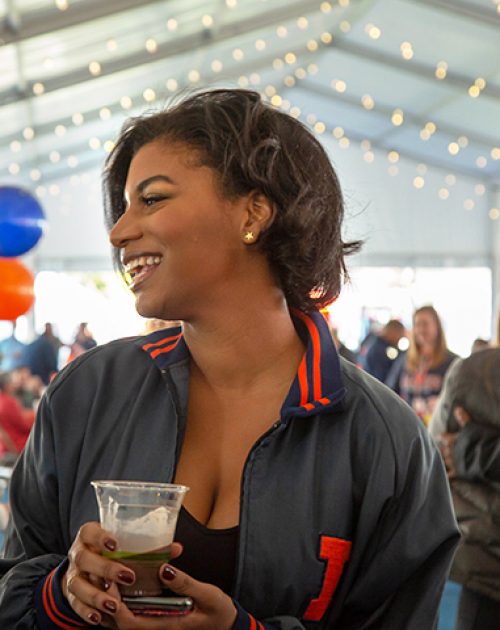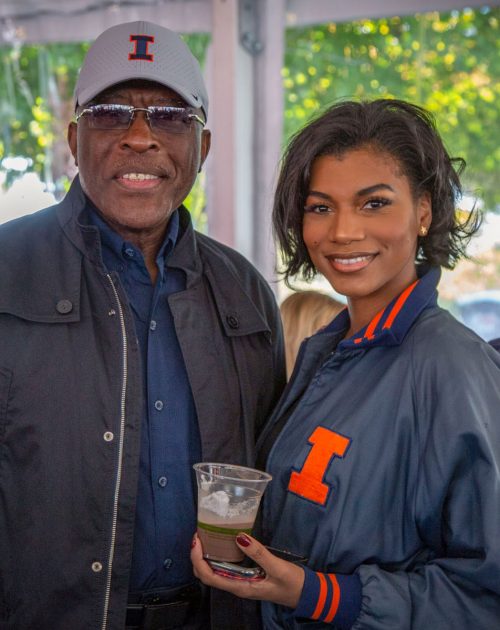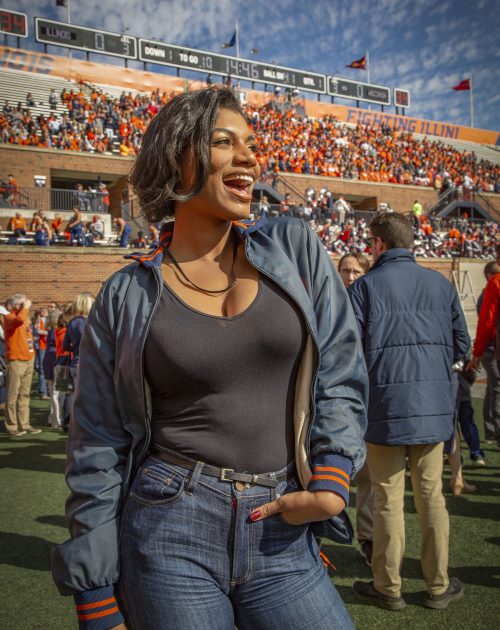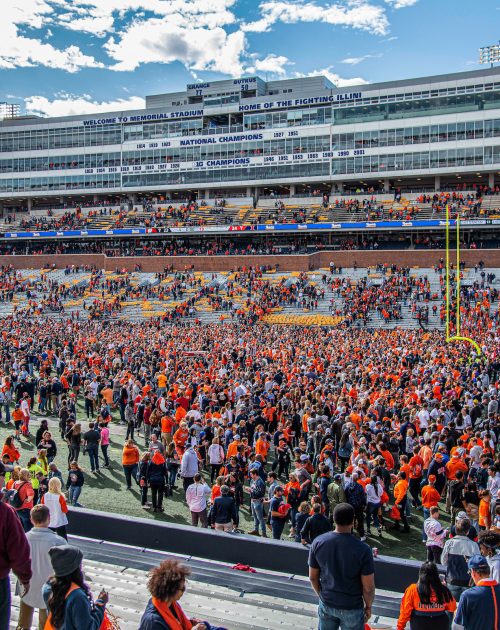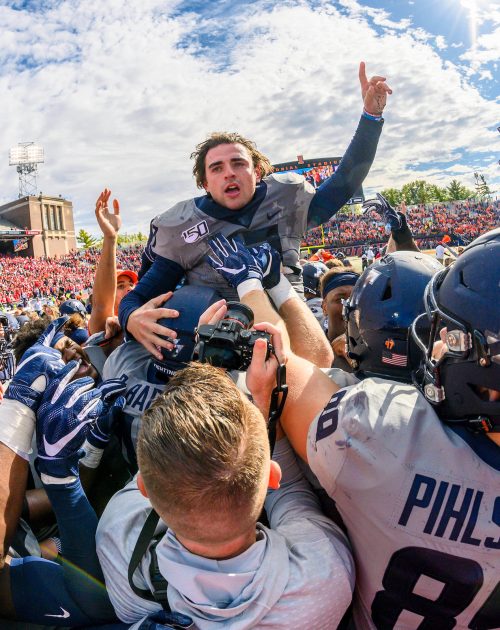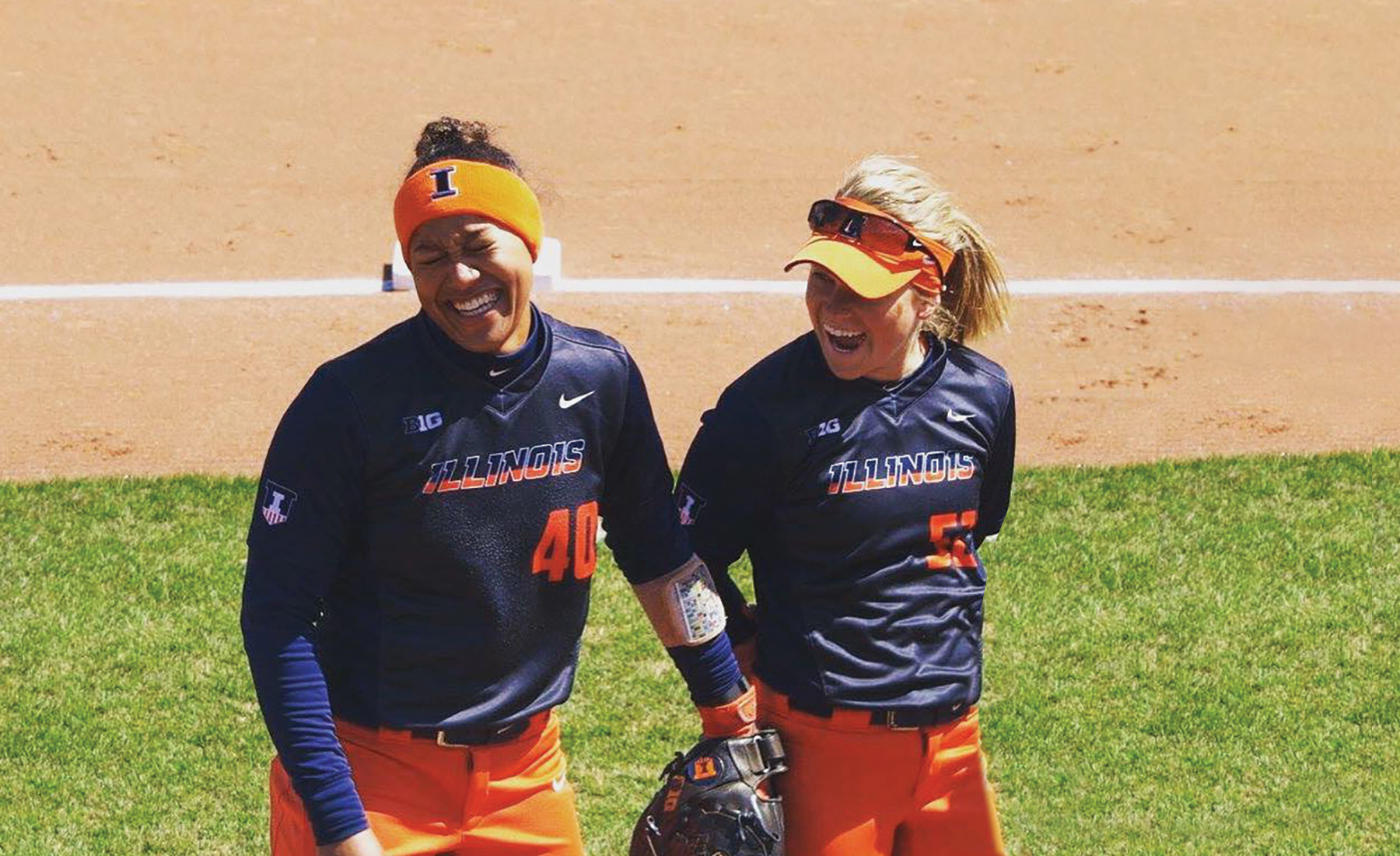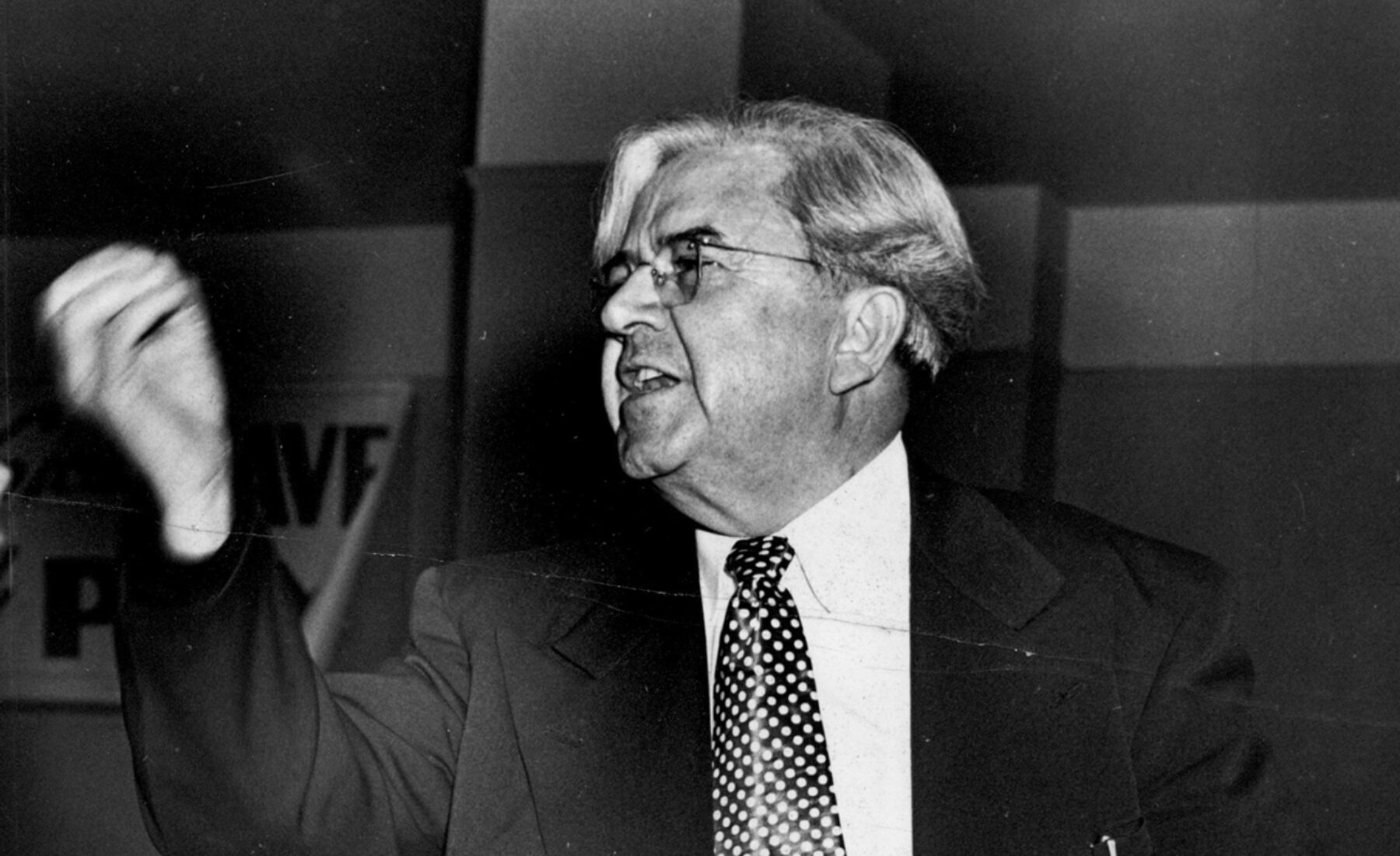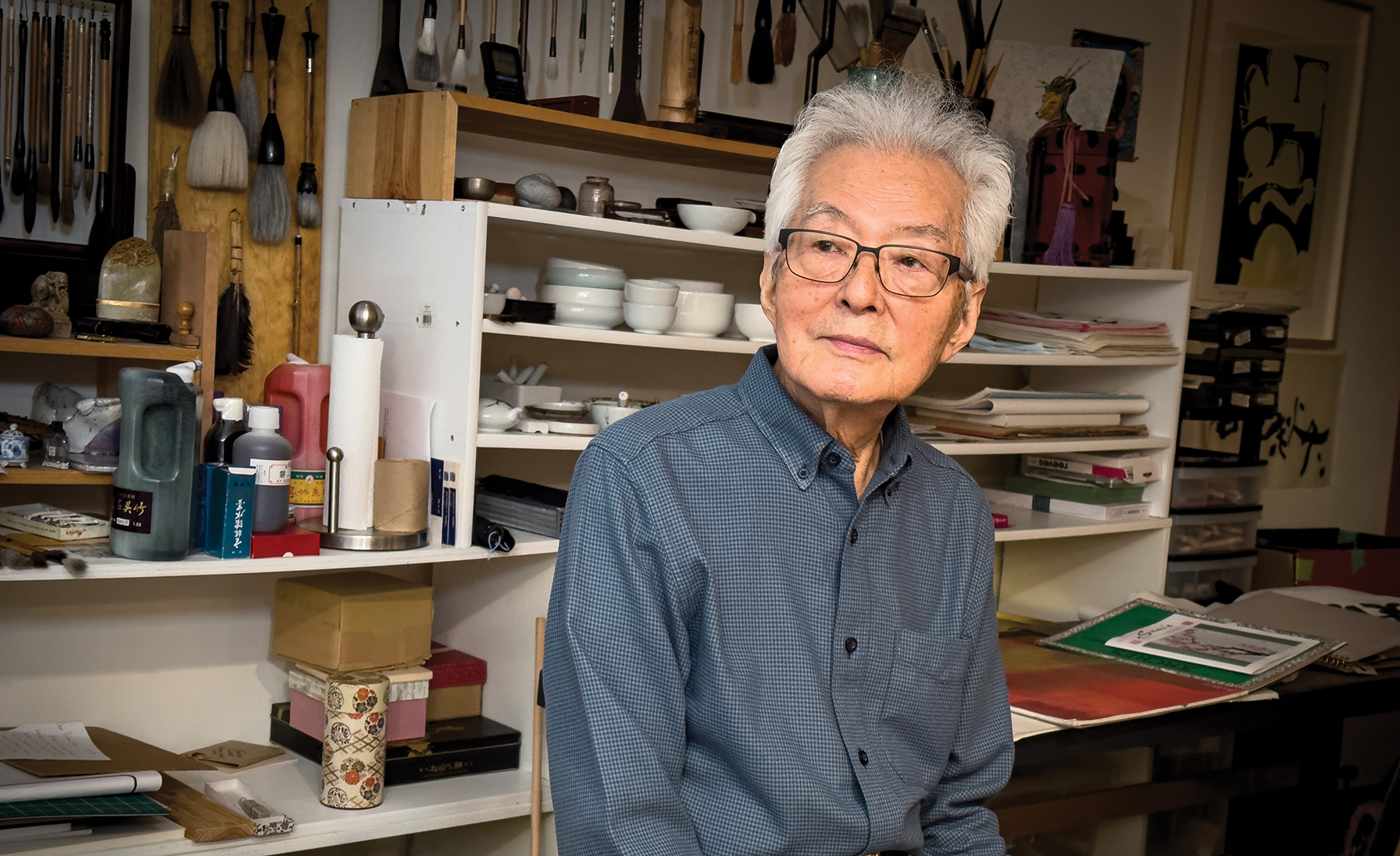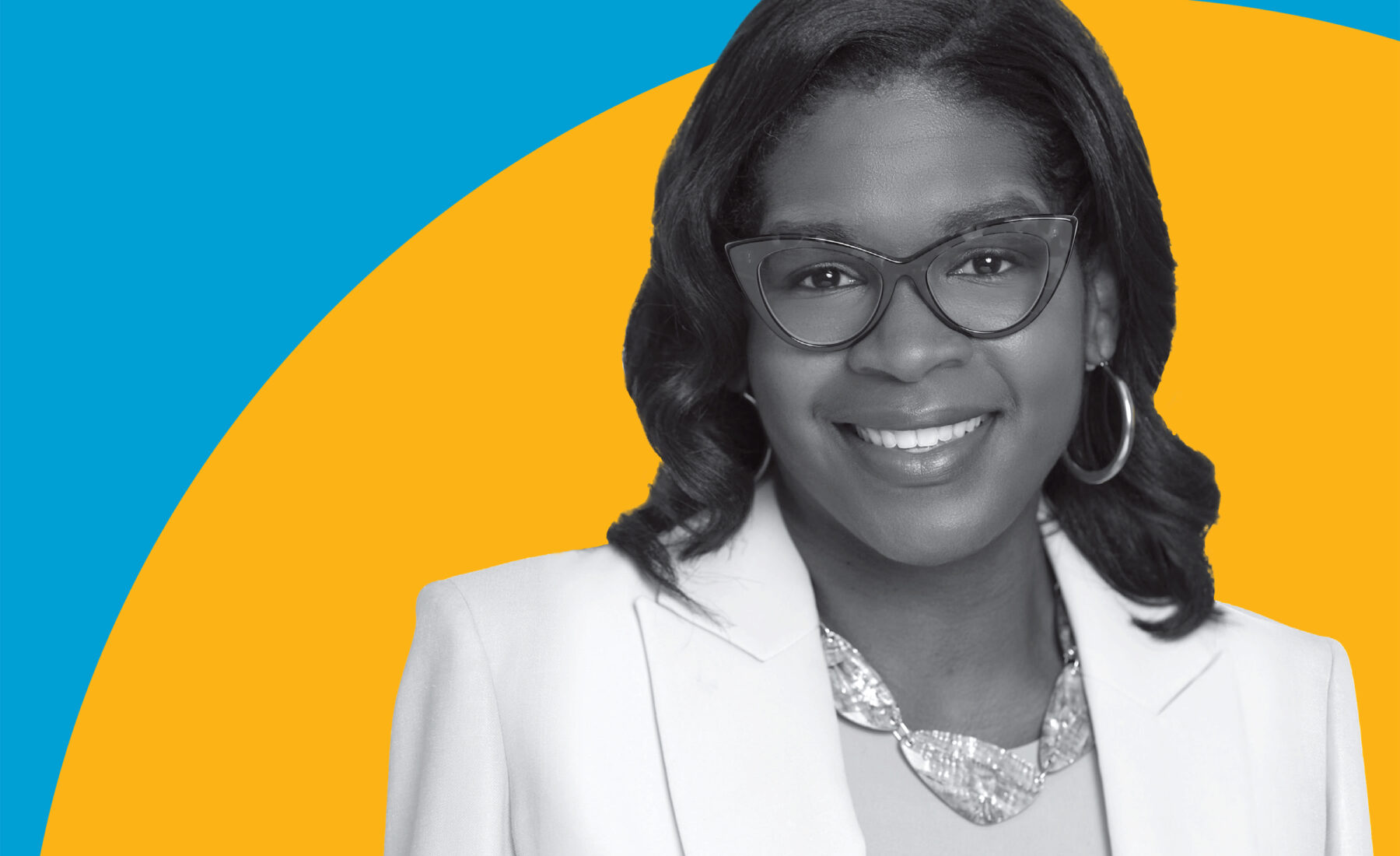It was the kind of magical day you can only dream up for a Homecoming football game. It was sixty degrees and the air felt crisp but the sun felt warm. The orange of the October trees blended in with the sea of orange and blue tailgaters.
It hadn’t been very long since Taylor Rooks (MEDIA ’14) attended these games as a student reporter, working up in Memorial Stadium’s press box first with scout.com and then with Big Ten Network. But this weekend, she flew in from New York to be a fan, holding her breath alongside tens of thousands of Illini as they watched James McCourt kick a thirty-nine-yard field goal in the very last second of the game to give Illinois the win over No. 6 Wisconsin.
As the fans exploded in unbridled (and stunned) joy, they flooded the field shouting ILL-INI and jumping up and down. Among them was Rooks, celebrating alongside her Illini family.
She was home.
Take It There
Rooks is only five years out from graduation, but she has already landed her own Bleacher Report web series, “Take It There with Taylor Rooks.” Each episode features Rooks interviewing an athlete—though she prefers to think of them as conversations rather than interviews. “I wanted to have something that was really just about them,” she said. “We try to put our guests in their natural element. We go to their homes, we go to their favorite restaurant. I want them to feel like it is their environment so they feel they can be themselves,” she said.
The first season ran eight episodes and featured Rooks in conversation with some of sports’ biggest names—stars like Jimmy Butler, Mo Salah, and DeMar DeRozan. She wanted to create a show that would reach beyond scores or statistics and move instead into a more personal space, where athletes could reveal more about themselves than what fans might see on the field or on the court. She approaches these conversations as she would with a friend: she is direct, authentic, and genuinely curious about her guests.
“People fall in love with the players because they fall in love with their stories,” she said. “Sports is really about people, for me. How do people take losses? How do they take wins? How do they handle things not going their way? Can they bounce back? How does a team that lost its first three games find themselves on their way to the Super Bowl?
“I just think that’s the beautiful thing about sports: it is about resilience, about coming back,” said Rooks. “I always love the idea of a group of people trying to be the best at something.”
‘Legacy is important to me’
In many ways, Rooks is equal parts her mother and her father. Rooks’ mother Stephanie (MEDIA ’85) was a broadcast journalism major. Rooks’ father Thomas (LAS ’87) played football for Illinois and is considered one of the best running backs in Illini history. He helped lead the Illini to victory during the 1983 Big Ten Championship season and played three bowl games in four years.
When Taylor was growing up in a suburb outside Atlanta, Georgia, Illinois came to her in bits and pieces—her dad’s Rose Bowl ring, orange and blue jerseys and jackets, the sounds of an Illini game filling the house on a Saturday afternoon. “When I was younger, I knew that Champaign was where my dad played football, where my parents met, where he had this run at Memorial Stadium against Ohio State,” Taylor said. “Legacy is important to me.” Her parents took her to Illinois on a campus visit while she was in high school and after visiting, she was set on attending—even though coming to Illinois meant putting hundreds of miles between her and home.
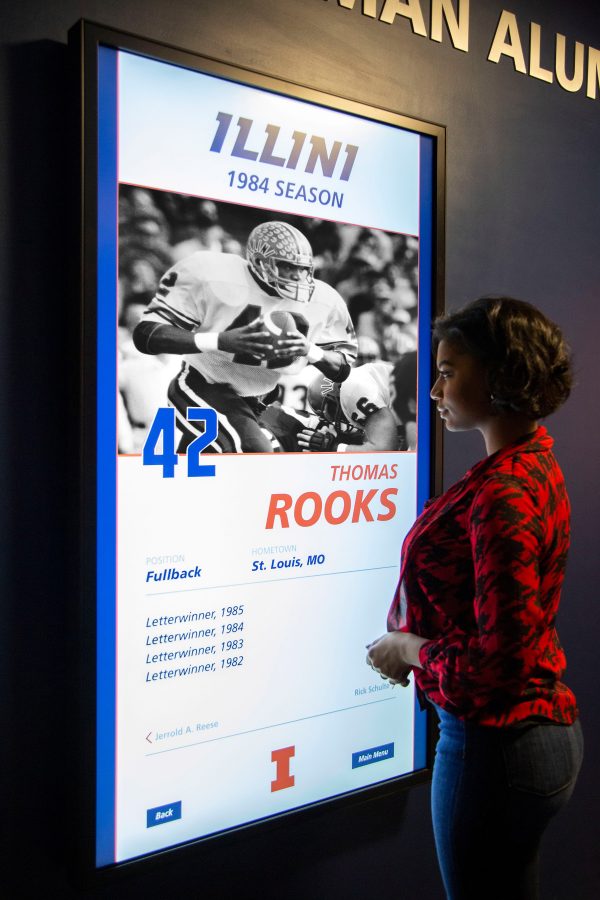
“Illinois felt incredibly familiar to me, because I had learned so much about it my whole life. I knew Scott Hall because my dad lived there. I knew my mother’s photograph hung in the African American Cultural Center along with her Delta Sigma Theta sisters. Illinois really was a home away from home,” she said.
While here, she covered nearly every home and away football and basketball game, started a blog to cover recruiting, and interned with the PGA Tour, Comcast SportsNet Chicago, CBS, and the Big Ten Network. She watched the drive and dedication she saw in the student-athletes around her, and matched it in her reporting.
And while Rooks has worked hard all throughout her career (in college and beyond), she admits that sometimes luck plays an important part, too. “It just so happened that the year I graduated, BTN was hiring for a new position. If I graduated and that job didn’t exist, my career could have been very different, and that is completely independent of all the hard work I did in school,” she said.
“It’s about being ready for those chances, and excelling when those chances do come your way.”
Finding her passion
Rooks knew that she wanted to cover sports, but she wasn’t sure exactly what kind of career she wanted to build for herself. She spent time reporting, anchoring, and blogging, but it wasn’t until she hosted her first podcast, “Timeout with Taylor Rooks” for SportsNet New York, that she realized how much she enjoyed conducting longform interviews.
“I realized this is it. I’m supposed to be sitting down and having conversations with people,” she said. “When you are interviewing you are really asking your guests to be self-reflective. Having to answer a question means you have to think about yourself, and what that answer means.”
Rooks claims that with athletes, their persona enters the room before they do. In her shows, Rooks lets them tell her viewers who they are beyond the Instagram post or the thirty-second clip after the game. And sometimes she has to ask the questions she knows the fans want answered, even if that is uncomfortable.
In the last episode of the season, Rooks interviewed DeMar DeRozan. “I knew the narrative around him at the time was that he wasn’t good enough to take the Raptors to the Finals, so I just asked him if that’s true, which is hard to hear,” she said. “But I knew that was the question everyone wanted to have an answer to.”
This understanding of the passion fans feel for their teams—both the intense joy with a win and the crushing blow of a loss—makes Rooks relatable to her viewers. She has her favorite athletes (Serena Williams), and she’s had her heart broken, too. Rooks is a diehard Falcons fan and, in 2017, when they lost Super Bowl LI to the Patriots after being up 21-3 at the half, she was crushed. “I was upset for a while. I’m honestly still not over it. This sounds crazy, but even the fans who hate a team because they lose? That comes from a place of love. You can only feel so intensely about a thing if you care about it intensely,” she explained.
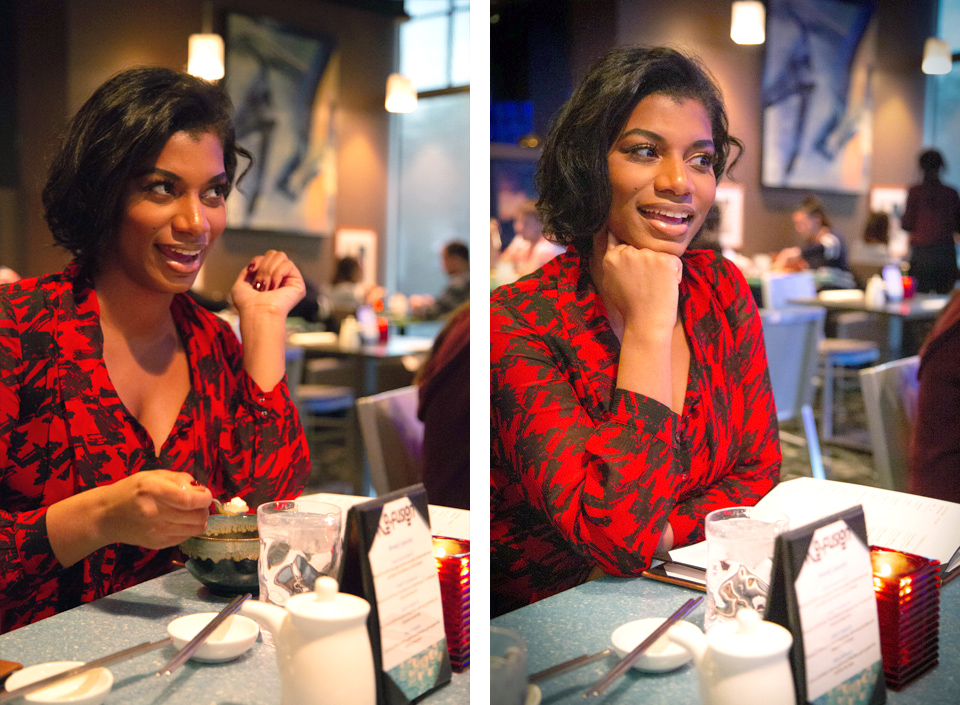
College sports remain special to Rooks, and she follows the Illini closely no matter whether the teams are winning or not. She argues that a team’s success is cyclical, and even the best teams were bad at one point. That is just the nature of sports. What matters is your loyalty. “There’s just much more of a passion, a fire behind college sports. You stay loyal because of how much you love Champaign…because you love how the school makes you feel,” she said. “Fans are deeply connected to the place.”
Coming home
While she was back for Homecoming, Rooks met with students from the College of Media, reconnected with friends in the press box, visited her favorite spots, and toured the new Smith Football Center. Like so many alumni who come back to campus, she reflected on the buildings coming down and those going up, the subtle changes that shift a landscape over the years. She also found comfort in the familiar: the steadfast pose of Alma, the energy from the students.
She acknowledges that this is the place where it all began for her.
“I know that for a fact that my life would be a hundred percent different if I did not come to Illinois,” said Rooks. “I was welcomed with open arms. They let me interview people and come to practices. I became a media member in the Big Ten Conference where they take sports incredibly seriously.
“I credit so much of how things have happened to being blessed enough to come to this place. The environment really did breed success for me. Everything fell into line, because this was a place I felt like I belonged.”

